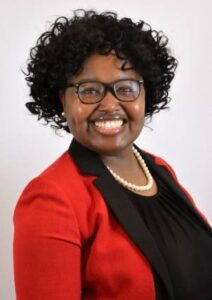Patients and their families at Children’s National Hospital in Washington, D.C., may not fully appreciate what a compassionate provider they have in pediatric resident Adaobi Ugochukwu, MD—that is, until she reveals that she, too, has lupus and has battled it for most of her life. It was the very fact of having lupus, and her encounters with providers that initially inspired her to pursue a career in medicine.
“I just wanted to be able to use my own personal experience to help other peoplem,” says Dr. Ugochukwu. She experienced many of the obstacles that pediatric rheumatology patients and their families encounter, including six years from onset of symptoms to diagnosis, long drives to access care, a shortage of pediatric rheumatologists and painful bullying in school. These struggles may be all too familiar for families whose children develop rheumatologic disease. Dr. Ugochukwu has made it her calling to change those trajectories for her young patients.
In addition to her post as a pediatric resident, she has become a support group facilitator and an ambassador for the Lupus Foundation of America. She has a quest to bring improved care to others. To promote awareness of the complicated struggles these patients and families must navigate among her colleagues, she often takes the opportunity to speak at various venues. For example, at ACR Convergence 2024, Dr. Ugochukwu was a participant in a session titled Cultural Humility for the Pediatric Rheumatologist. And during a recent in-depth interview with TR, she recounted some of the major milestones of her own childhood journey with lupus.
Puzzling Symptoms
Born in Jamaica of Nigerian descent, Dr. Ugochukwu grew up in Tallahassee, Fla., and is one of three children in her family. What began as “really bad fatigue” in elementary school worsened when she was 9 or so. The degree of fatigue was confusing to her. She noticed that her siblings were able to complete their chores more quickly. She wasn’t able to keep up with her classmates at recess, and began spending that period in the library. She says she recalls looking at tall buildings and wondering, “Is everyone as tired as me? Because there’s no way that they could build skyscrapers and these tall buildings if everyone was as tired as me.”
At the age of 11, she began having symptoms related to arthritis, pericarditis and anemia. Pain in her ankles and feet impaired her ability to move from class to class. She was no longer able to play the saxophone in the school band. Neither she nor her parents understood that her symptoms were connected to each other. Her episodes of shortness of breath and sharp chest pains led to emergency department visits, where she would get treatment but never an explanation for her condition.


